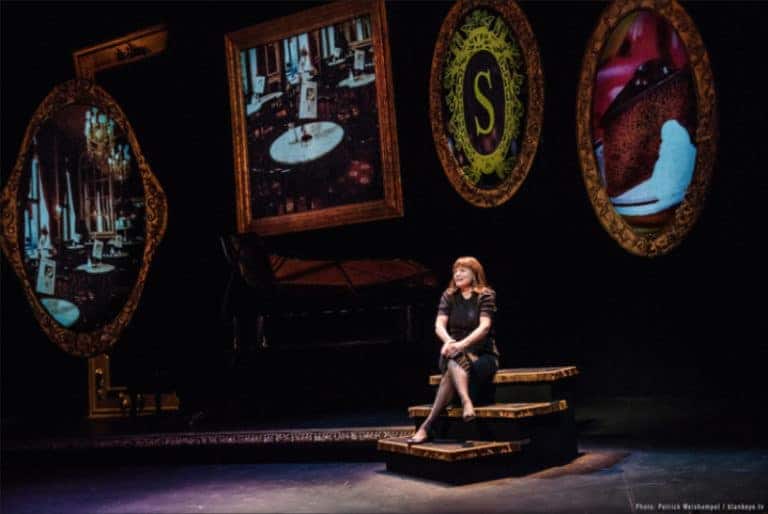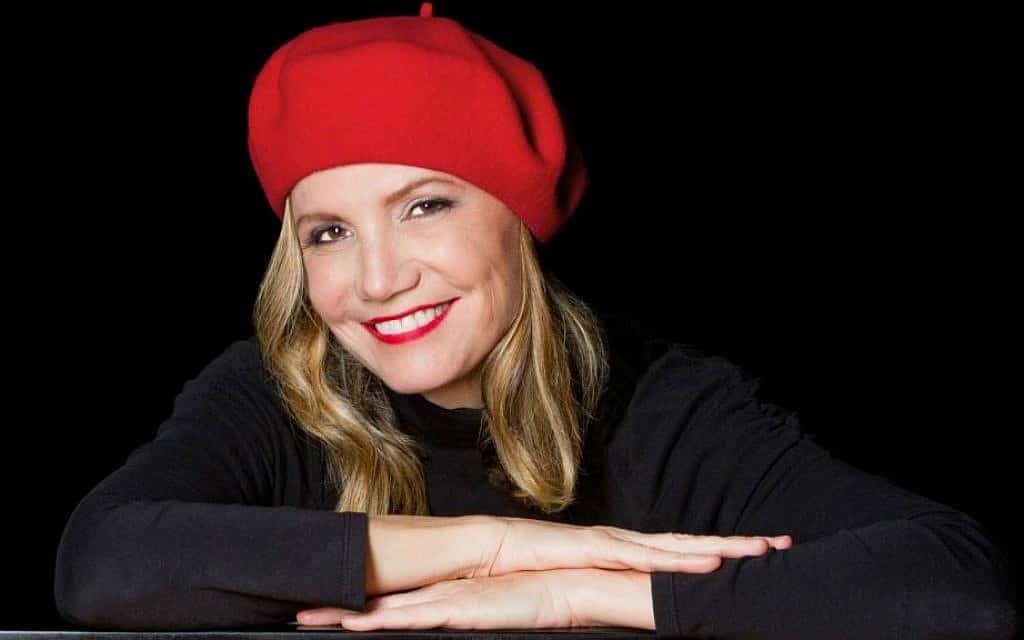Anyone who loves music, fine acting, or just a good story, must be sure to see The Pianist of Willesden Lane, running through June 29 at Portland Center Stage. People who saw it a year ago are coming back to get another dose of heroism set to Grieg, Chopin, and Rachmaninov, in a one-woman show expertly played and acted by Mona Golabek.
I had recently read Golabek’s book and I was eager to interview her for Oregon Arts Watch. Her book, The Children of Willesden Lane, tells the story of her mother, Lisa Jura, who, as a 14 year-old, escaped the terrors of Nazism and managed to develop her musical career despite incredible obstacles. Children like Lisa fled Hitler on the Kindertransport — trains that carried Jewish children from Germany and Austria to safety in England. The English, especially the Quakers, were very kind to the children, but were suffering their own deprivations and could not offer them much beyond subsistence. Lisa Jura’s story and her daughter’s portrayal of it provide inspiration in an otherwise gloomy time.

I caught Golabek at a momentary lull in her busy schedule. I turned on the speaker- phone and propped up my digital recorder, acknowledging that we’d be fine as long as my cat didn’t knock them over. (I knew she had a soft spot for animals.)
Early in our conversation I asked her about concertizing. In addition to these one-woman shows she performs as a soloist with orchestras all over the world. With their mother as their piano teacher, both Mona and her sister Renee grew up to be concert pianists.
“One day,” Golabek told me, “I was engaged to play the Grieg Piano Concerto. So I thought, Wow, that’s the piece my mother always told me about! She wanted to make her debut with the Grieg. That was the dream she had back in Vienna, her dream on the trolley,” a scene described in the book.
“Did she make her debut with the Grieg?” I asked.
“Yes. Her dream became true, but later in London.”
What Golabek said next gave me chills. “This November I’m going to Vienna and I’m going to make my debut in the Musikverein, where she dreamed of making her debut. And I’m going to play the Grieg.”
I asked for the date in case some of her fans from Portland might want to get tickets.
“Sure! It’s November 28th. It’s timed to coincide with the German edition of the book, which is coming out in October.” She will appear at book signing events throughout Germany and Austria during that time.
Golabek has wanted for years to honor the memory of her mother and spread the message of her steadfast dedication to music. After she wrote her book she tried to figure out how to work her message into a play, and finally persuaded Hershey Felder to assist her in the development a one-woman show. Felder (who performed at Portland Center Stage last season in his own one-man show, Hershey Felder as Irving Berlin; see my interview with him here) was a great help.
I asked how Golabek learned to play the piano and talk to the audience at the same time. (I consider this an amazing feat since I can’t even listen to music and read the newspaper at the same time.)
“Everybody comments on that. I had to work hard to be able to do that.”
“And the acting, too. Did you have to work at it or did it come naturally?”
“I had to work very hard at it. I had to learn how to do all of this.”
When I asked how it was to work with Felder, she replied, “I don’t have enough words to describe my gratitude, respect, and admiration — and just lovefor Hershey Felder! He’s extraordinary. He’s a genius. He took a chance on me. He fell in love with the story, took the book, and adapted it for the stage. He took my concept, made it into a sort of mini- performance, then he challenged me to become my mother. He had me get a wig, put it on, and take acting lessons. Then he brought his magic, the extraordinary magic of design, to the stage. He and his team came up with the amazing concept of these frames, sort of like old-world frames from a museum, and you can project a world that has gone.”
We talked for a while about music and we agreed that knowing more about the composer seems to enhance one’s understanding and appreciation the music, not only accessible pieces, but even abstract ones.
Golabek hosts a radio show titled The Romantic Hours. Responding to the challenge of making classical music more accessible to a wider audience, she blends the music with the composers’ stories. Who did they write the music for? What did they say in their letters and poems?
“It all relates to what my mother told me as a child. She said each piece of music tells a story. You just have to discover what that story is. When I play any musical composition I’m really thinking about the story behind it, about the composer’s life, the letters he wrote, what happened to him.” For The Pianist of Willesden Lane, each piece of music she has chosen is identified with a certain time in her mother’s life.
Golabek has extended her passion for music and her devotion to her mother’s story to some important work with young people. She created the Hold On To Your Music Foundation, which derives its name from the parting words of her Viennese Jewish grandmother to her daughter, Lisa, as she boarded the Kindertransport for London. Golabek has also enlisted the help of several foundations to support her educational programs, her latest endeavor being the Willesden Read Project. This project provides copies of the book to cities and school systems, professional development for teachers, and live performances for the students by Mona.
“This is my most fervent mission,” she says. “It’s an ambitious, massive project. We’ve done it all over the world. We just did it in New York for 13,000 students at the United Nations Town Hall, and we did it for the entire fifth grade in Dallas, Texas. We’ve done it in Chicago and Cleveland and Los Angeles. Now we’re working here in Portland with the Regional Arts and Culture Council and with Portland Center Stage. Soon we’ll identify a large hall here in the city.”
It sounds like Mona Golabek will be back to Portland another time, and this time our kids will be able to be inspired by her mother’s courageous story.
Before I let her go I wanted to ask her about her love of animals. I noticed that she had performed Ravel’s Mother Goose Suite with her sister Renee, narrated by Meryl Streep.
“Yes, but my best-selling album is called The Carnival of the Animals. I brought together 13 actors and they each had a cause to help animals. For example, Betty White had the L.A. Zoo, and Audrey Hepburn had the ASPCA. Everybody donated their efforts toward this project.” Other celebrity readers included James Earl Jones, Lily Tomlin, and Walter Matthau. The actors read verses by Ogden Nash while Mona and Renee played the Saint Saëns underneath.
When asked about pets, she replied in the negative. “Because of my travel schedule I don’t have pets. One day I hope to. But they deserve to have a proper parent, you know.”
That day may be a ways off, judging by Mona Golabek’s passion for her music and her message.




